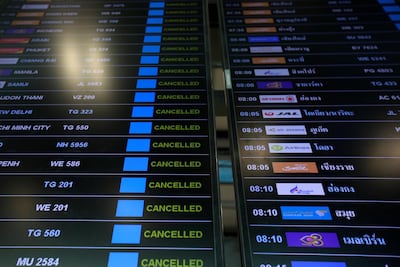Telecom operators could lose more than $25 billion (Dh91.75bn) in roaming revenues over the next nine months, as the travel industry globally comes to a halt on the back of the coronavirus pandemic, according to London-based Juniper Research.
Nearly half of the revenue decline will be incurred between June and August as people are unable to travel. Roaming revenue is earned from fees charged when a user connects to a new mobile network, while travelling abroad.
The ongoing health crisis is likely to place "the entire roaming model under threat," Matthew Kendall, chief telecoms analyst at the Economist Intelligence Unit, told The National. The greatest challenge is "particularly from a business travel perspective, if work-from-home stays for a more long-term basis and virtual conferencing becomes more commonplace", he added.
Covid-19, the biggest pandemic since the 1918 Spanish flu, has infected more than 2 million people and killed over 137,000, according to Johns Hopkins University, which is tracking the outbreak.
Despite ongoing travel restrictions hitting roaming charges, analysts said operators have diversified revenue streams and the impact of declining income will be limited.
“Roaming will be impacted but it constitutes a very small part of the overall revenues… $25bn is quite a big number but its very small in the broader industry context,” said Sam Evans, senior partner with consultant Delta Partners.
Global roaming revenue accounts for about 6 per cent of total operator-billed revenue per year, which limits the impact of the pandemic on the industry. Overall industry revenue is forecast at $820bn this year, Juniper forecasts.

Roaming revenues used to be a high margin segment for the mobile carriers, but it is no longer a profitable business, according to Neil Campling, co-head of Mirabaud Securities’ Global Thematic Group.
“In Europe, it disappeared in June 2017 after the EU [European Union] law to abolish roaming charges for people travelling to other European countries.”
“The US carriers have all adopted set international day pass rates or, for example, T-Mobile now offers free international roaming on post-paid plans in 140 countries. So even with curtailed travel, the impact shouldn't be significant for most carriers,” Mr Campling said.
As roaming revenues slump, telcos have started to focus on alternate revenue streams such as videoconferencing and over-the-top (OTT) services, moving away from “legacy revenue streams” and exploring new content creation and aggregation models to improve long-term revenue prospects, Mr Kendall said.
OTT subscriptions have grown globally as more people adhere to social distancing and stay at home. Research firm MarketsandMarkets said that a high internet penetration and easy availability of smart devices have further propelled the industry growth, which is expected to grow to $156.9bn in the next four years, from $81.6bn in 2019.
Meanwhile, videoconferencing apps such as Zoom and Skype are becoming increasingly popular. Zoom’s current number of daily users across surged to 200 million, from around 10 million in December, the company said.
“Hopefully, carriers will offset any decline in roaming revenue with other innovative services… they look very well-placed to do so,” Mr Evans said.
“The industry is going to see a lot of upsides in new revenue streams.”
But even as countries and telcos transition away from a roaming-dependent model, analysts cautioned that smaller countries who are more heavily reliant on tourism could be impacted.
“For destinations like the Caribbean, Fiji, the Bahamas, Tahiti, the Seychelles and the Maldives - it’s a big deal,” said Michael Davies, senior lecturer at Massachusetts Institute of Technology, who also runs the New Technology Ventures programme at London Business School.
Revenues from roaming have also become constrained as consumers are moving to OTT apps such as WhatsApp, in combination with the use of local SIMs or low-cost SIM-only services that specifically target global travellers, said Mr Davies.
Juniper Research found that trips cancelled due to Covid-19 pandemic are unlikely to be rebooked. As a result, this loss of roaming revenue might also not recover once the international travel industry resumes normal service.
Inbound and outbound retail roaming constitute between 3 per cent to 5 per cent of revenues for some of the larger operators, while for a few it may be as high as 10 per cent or more, making it a sizeable portion, according to the South Asia, Middle East and North Africa (Samena) Telecommunications Council, a Dubai-based tri-regional group that represents a community of telecommunications firms, manufacturers, regulators and academics.
“At this stage, however, little can be said about actual losses and the overall impact on MNOs (mobile network operators), given the complexities of the Covid-19 impact across businesses and the uncertainties surrounding the duration of the crisis,” said Bocar Ba, chief executive of Samena.
Operators have also taken extra measures and are providing bundles with very competitive pricing for data roaming.
“To avoid bill shocks, there are also other mechanisms to notify customers when they cross a certain threshold, as is now a practice all around the world,” Mr Ba said.


